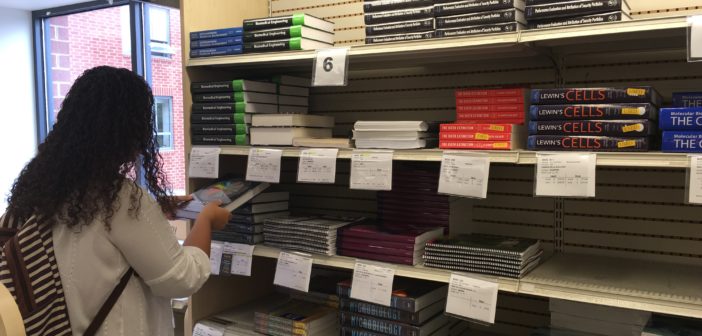With the high cost of college textbooks, some students struggle to purchase the expensive reading materials required for their classes.
Though most textbooks required for classes are sold in the Lehigh bookstore, some students seek more cost-effective alternatives to buy their reading materials the start of the every semester.
One student, Jesse Galloway, ’20, turned to online shopping to purchase his books.
“In general, I think textbooks are overpriced, hence I didn’t buy any (from the bookstore),” Galloway said. “I prefer a (physical) copy to a digital copy, but they’re so expensive, and because other options are out there, it’s just not worth it.”
Many students turn to Chegg, Amazon.com and other online sellers in search of cheaper prices.
In response to increased competition from online retailers, the Lehigh bookstore introduced a price-matching program, according to a promotional flier. With this new program, students can bring in proof that a book is priced cheaper on either Amazon or BN.com, and the bookstore will match the price accordingly through the first week of classes.
If a book purchased at the Lehigh bookstore is sold at a cheaper price on Amazon or BN.com, the bookstore will refund the student the difference, according to the flier. However, online marketplaces, such as “other sellers” on Amazon and Amazon warehouse deals — which typically sell books at discounted prices — are not eligible for the price-matching program.
In one semester, a finance major might spend nearly $900 at the Lehigh bookstore for three required books: “Investments,” “Strategic Management: Concepts” and “Fundamentals of Corporate Finance.”
Both Amazon and BN.com charge nearly $800 total for the same three books. However, students can find the books for approximately $300 through third party sources on Amazon, saving them about $600. The Lehigh bookstore will not match the prices of books from third party sources.
Students are often required to purchase online access codes along with their textbooks in order to complete online homework assignments. Ali Elkin, ’17, was required to purchase a $90 access code at the bookstore for her “Strategic Management: Concepts” textbook. Access codes are so expensive that students often opt out of buying the physical textbook itself, Elkin said.
“It angers me a lot because homework is nearly 20 percent of my grade and I have no choice but to buy the access code,” Elkin said. “Sometimes I end up not buying the textbook and I just buy the access code, and this hinders my ability to complete homework assignments.”
A representative from the Lehigh bookstore was not available for comment.
Some professors, like Ziad Munson, an associate professor of sociology, said the bookstore’s high costs complicate textbook ordering procedures for faculty members. He doesn’t order books from the bookstore for this classes anymore.
“On my side, the bookstore makes it very difficult for faculty to order books,” Munson said. “They want the orders very far in advance and it’s more than just a practical concern. If I want my classes to be up to date and to have the most recent information and research, I can’t just order them at the time the bookstore wants, because it’s so many months in advance.”
Buying books can be a heavy financial burden on students, Munson said. He encourages students to shop around. For Munson, moving away from the university bookstore allowed him to have a better syllabus and make buying textbooks cheaper for students.
Another alternative to purchasing textbooks is the Lending Library, a system developed by students last spring semester. Susan Ellis, the program director for the Academic Advising Center, guided students in the process of developing the Lending Library.
“They started collecting books at the end of the spring semester last year through the Community Outreach Office,” Ellis said. “They collected about 18 boxes of books, some of which were useful, some of which were not.”
The boxes of books were put at the circulation desks at Fairchild-Martindale Library and Linderman Library, said Sharon Wiles-Young, the director of Library Access Services. Students collected textbooks donations and found textbooks at the South Side Sale.
“We have about 300 (textbooks) now, and that was pretty quick work when we started in the spring semester, and not many students were aware of what we were trying to do,” Wiles-Young said.
The student team is now organizing the textbooks on the shelves by academic discipline, she said.
The Lending Library will allow Lehigh students to sign out books and return them at the end of the semester. This system will use the honor code without any official tracking, Wiles-Young said.
“We heard about this need and we said that’s fine, we have shelving available,” Wiles-Young said. “We’re not making any cuts about which students can take out these books. I think everybody deserves a book when they are high-cost.”
Using Brown University’s First-Generation Low-Income Partnership program as a model, the Lending Library hopes not to undermine the bookstore, but to aid all students who feel the burden of buying high textbook prices.
FLIP is a student-run initiative aiming to make textbooks available for not only first-generation Brown students, but also for all students challenged by the burden of expensive textbooks, according to the Brown University Library News website. The student group collects and maintains records, and distributes and re-shelves the books.
“We thought, if Brown could do it, we could do it to,” Ellis said.






Comment policy
Comments posted to The Brown and White website are reviewed by a moderator before being approved. Incendiary speech or harassing language, including comments targeted at individuals, may be deemed unacceptable and not published. Spam and other soliciting will also be declined.
The Brown and White also reserves the right to not publish entirely anonymous comments.
2 Comments
Another great resource is DirectTextbook.com. Our service compares prices from dozens of online bookstores to find the lowest textbook prices.
Pingback: Graduate students deserve a healthcare plan with teeth – Columbia … – CU Columbia Spectator | eegbusiness